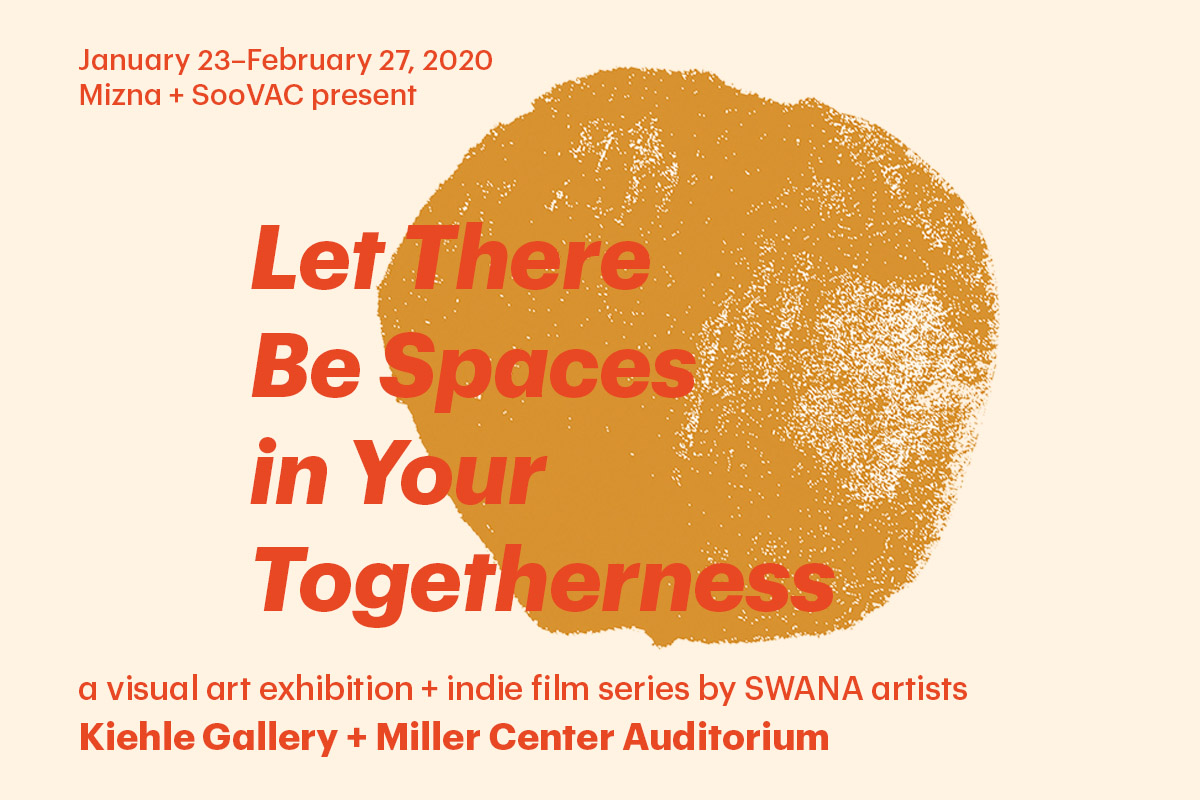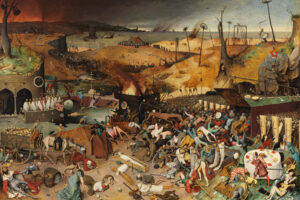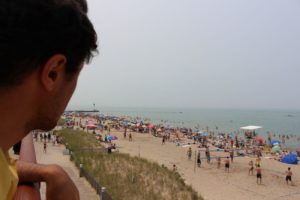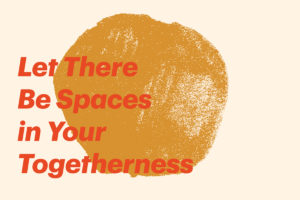
December 17, 2019
St. Cloud State University: a visual art exhibition + indie film screenings
This January, Mizna is partnering with SooVAC to bring contemporary arts programming by SWANA artists + filmmakers to greater Minnesota. Visual arts exhibition Let There Be Spaces in Your Togetherness will travel to St. Cloud (January 30–February 27, 2020) and New York Mills (March 4–April 4, 2020), accompanied by a selection of notable films from our annual Arab Film Fest. These events are for any and all who are curious about SWANA/Arab/Muslim narratives — all are welcome!
There will be an opening reception and screening of Dachra at SCSU on Thursday, January 30. More details here.
About Let There Be Spaces in Your Togetherness

This visual art exhibition features the work of emerging US-based artists from the Southwest Asian and North African (SWANA) region or of SWANA descent. Named from a quote by the famed Lebanese poet Khalil Gibran, Let There Be Spaces in Your Togetherness showcases the perspectives, practices, and artworks of a new generation of US-based SWANA creatives as we look toward another two decades of cultivating rich spaces. Spaces in which, in Gibran’s words, “the oak tree and the cypress grow not in each other’s shadow,” spaces in which the diversity and artistry of our community is celebrated and sustained. This show was juried by Essma Imady, Hend Al Mansour, and Lamia Abukhadra, three Arab artists based in the Twin Cities, who will show works alongside the selected artists.
About Mizna’s Arab Film Fest
Having just completed its fourteenth year, the Arab Film Fest is breaking out for a special “best of the fest” tour to greater Minnesota — an unmissable chance to see thoughtfully curated films from SWANA filmmakers. Over the years, our festival has created a necessary space in the Twin Cities for Arab and Muslim filmmakers to tell their stories in beautiful and innovative ways. The selected films tell stories from Jordan, Sudan, Palestine, and Tunisia, and span a variety of genres, including horror and documentary.
Dachra– January 30
Abdelhamid Bouchnak / Horror / 113 min / 2018 / Tunisia / Arabic + French with English subtitles

Set against the backdrop of contemporary Tunisia, Dachra revolves around 3 journalism students who set out to investigate a coldcase. As they pursue their investigation, the three friends stumble into the archaic and ominous world of Dachra, an isolated countryside compound filled with goats, silent women, mysterious drying meat. When a jovial but menacing local invites them to stay overnight, Yasmin is drawn into Dachra’s dark secrets and a desperate attempt to escape alive.
Speed Sisters– February 6
Amber Fares / Sports Documentary / 80 mins / 2015 / Palestine / Qatar / Canada / English + Arabic with English subtitles

Despite a tangle of roadblocks and checkpoints, a thriving street car racing scene has emerged in the
West Bank. Held at improvised tracks, the races offer a release from the pressures and uncertainties of life under military occupation. The fanfare and rivalry between cities brings spectators out in droves, lining rooftops and leaning over barricades to snap photos of their favorite drivers and to catch the final scoreboard. A riveting documentary, Speed Sisters follows the first all-women racing team in the Middle East. Grabbing headlines and turning heads, the film weaves together their lives on and off the track.
Tiny Souls– February 20
Dina Naser / Documentary / 86 mins / 2019 / Jordan / Arabic with English subtitles

This documentary follows Marwa, her siblings and her mother in 2012 as they settle into Jordan’s Zaatari refugee camp after escaping war in Syria. Over their four plus years at the camp, the director follows Marwaʼs everyday life as she blossoms into a young woman, one who imagines herself as a “free pigeon” unrestricted by walls and barbwire. Their “settled” life takes an immense turn when her brother is called in for questioning, revealing the uncertainty of their situation.
Sudanese Shorts– February 13
4 shorts / 66 mins total / Sudan
During the late ’70s and early ’80s, a group of filmmakers at the Sudanese Department of Culture issued a periodical named Cinema. In April 1989, they founded the Sudanese Film Group to gain more independence from the state and to fully engage in all aspects of film production, screening, and teaching, as well as maintaining the passion of the Sudanese for the cinema. However, the June 30, 1989 coup d’état, which brought with it a suspicion of all forms of art, terminated any cultural aspirations and banned all civic society organizations. Finally in 2005, the heavy hand of the state was loosened somewhat, and the SFG was able to re-register. Arsenal—Institute digitally restored selected works by these filmmakers in 2018.

Jamal / Ibrahim Shaddad / 1981 
Wa Lakin Alardh Tadur /
Suliman Elnour / 1978
Jamal / A Camel / جمل
Ibrahim Shaddad / 14 mins / 1981
Jamal is a report from the life of a camel, most of which plays out in a dreary, small room—a sesame mill.
Ibrahim Shaddad was born in Halfa, Sudan, in 1945 and studied at the Filmuniversität Babelsberg KONRAD WOLF. He has written and directed many films and plays. Practically all films and plays in Sudan were discontinued by producers or banned by governments. He is a founding member of the Sudanese Film Group and a member of the editorial board of the magazine Cinema.
Wa Lakin Alardh Tadur / It Still Rotates / ولكن الأرض تدور
Suliman Elnour / 19 min / 1978
Suliman Elnour’s graduation film Wa Lakin Alardh Tadur depicts a typical school scene in Yemen during the time the film was made.
Suliman Elnour was born in 1947 and is a Sudanese filmmaker and writer. He studied folklore, and African and Asian studies at the University of Khartoum and film at Gerasimov Institute of Cinematography, Moscow. He is a founding member of the Sudanese Film Group and a member of the editorial board of the magazine Cinema.

Al Mahatta / Eltayeb Mahdi / 1989 
Al Dhareeh / Eltayeb Mahdi / 1977
Al Mahatta / The Station / المحطة
Eltayeb Mahdi
16 mins | 1989
In Sudan, in the late 1980s, people cross the desert on foot or cover long distances by car and truck. Al Mahatta shows encounters at one of the large crossroads between the capital Khartoum in the center of the country and Bur Sudan on the Red Sea.
Al Dhareeh / The Tomb / الضريح
Eltayeb Mahdi
17 mins | 1977
Al Dhareeh tells the story of a man who claims to be able to heal people.
Eltayeb Mahdi was born in Omdurman, Sudan, in 1951 and studied at the Higher Institute of Cinema in Cairo. He is a founding member of the Sudanese Film Group and a member of the editorial board of the magazine Cinema.

This activity is made possible by the voters of Minnesota through a grant from the Minnesota State Arts Board, thanks to a legislative appropriation from the arts and cultural heritage fund.












